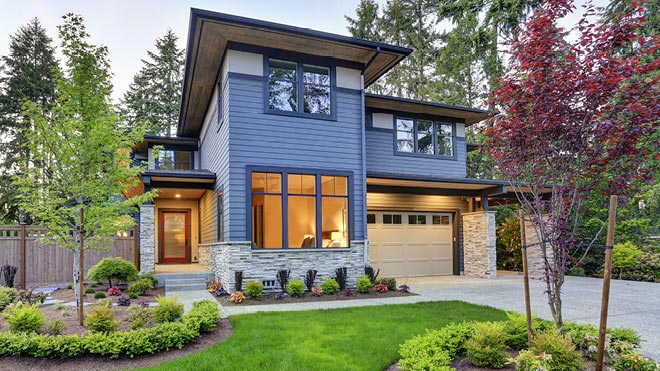The evolution of residential spaces has always mirrored technological advancements, societal changes, and environmental concerns. Today, the modern home is a testament to human innovation, incorporating many upgrades and innovations designed to enhance comfort, efficiency, and sustainability. These enhancements cater to homeowners’ aesthetic and functional needs and contribute significantly to environmental conservation efforts.
One crucial aspect of contemporary home improvement is the focus on health and well-being, mainly through indoor air quality. Recognizing the importance of this, many homeowners are turning to online resources and tools for guidance. For instance, one of the options is a free air quality assessment tool which offers an accessible way to evaluate and subsequently improve the air within one’s living spaces.
But aside from indoor air quality tools, below are some common upgrades and innovations that can be seen in modern homes:
Smart Home Technology
Smart home technology redefines the concept of convenience and personalization in modern living spaces. By integrating devices like smart thermostats, homeowners can enjoy a living environment that automatically adjusts to their daily routines and temperature preferences, ensuring comfort while optimizing energy use. These thermostats can analyze usage patterns over time, making proactive adjustments to maintain ideal conditions and reduce unnecessary energy consumption.
Similarly, smart locks and security systems have revolutionized home safety, offering remote door lock control, surveillance camera access, and real-time smartphone alerts. Biometric authentication, using fingerprints or facial recognition, adds an extra layer of security, ensuring that only authorized individuals can access the property. These advancements can enhance the functionality and safety of homes and contribute to a more sustainable and energy-efficient lifestyle.
Sustainable Living Solutions
In an era where environmental consciousness is paramount, sustainable living solutions are increasingly becoming integral components of the modern home. Solar panels, for instance, harness renewable energy from the sun, significantly reducing reliance on fossil fuels and decreasing electricity bills. Energy-efficient appliances that use minimal electricity, water, and gas further enhance this eco-friendly approach.
Beyond energy conservation, water-saving practices like rainwater harvesting and graywater recycling systems are gaining traction. These systems collect and repurpose rainwater for gardening and redirect water from showers and sinks for use in toilets, reducing a household’s overall water consumption. By adopting these sustainable living solutions, homeowners can play a crucial role in preserving natural resources and mitigating the impacts of climate change, all while enjoying financial savings from reduced utility costs.
Innovative Building Materials
The shift towards innovative building materials marks a significant evolution in the construction and renovation of modern homes, focusing on environmental sustainability, health, and longevity. For instance, non-toxic, low-VOC paints and finishes are becoming a standard choice for homeowners concerned about indoor air quality and the potential health risks associated with traditional paints. These eco-friendly options provide a safer indoor environment, free from harmful chemicals, without compromising color richness or durability.
Composite decking materials are redefining outdoor living spaces in construction. Made from a blend of wood fibers and recycled plastics, these materials resist fading, staining, warping, and insect damage, offering a sustainable alternative to traditional wood decking. This shift can reduce the demand for virgin timber and provide homeowners with low-maintenance, aesthetically pleasing outdoor areas that withstand the test of time.
Advanced Home Entertainment Systems
The landscape of home entertainment has undergone a seismic shift with the advent of cutting-edge technologies. High-definition, smart TVs provide crystal-clear visuals, making movie nights a cinematic experience. Immersive sound systems, with their multi-dimensional audio, envelop the viewer in a cocoon of sound, heightening the realism of every scene. Virtual reality setups go further, offering interactive experiences that transport users to different worlds.
The convenience of streaming services adds another layer, bringing a virtually endless selection of movies, shows, and music directly into the home. These innovations have transformed living rooms into sophisticated entertainment zones, tailored to each household member’s diverse tastes and preferences.
Health and Wellness Features
In contemporary homes, the emphasis on health and wellness is evident in the design and features. Ergonomic furniture supports proper posture and comfort, reducing the risk of musculoskeletal issues. Natural lighting solutions, such as skylights and large windows, flood interiors with sunlight, boosting vitamin D levels and improving mood.
Home gyms, equipped with a range of fitness equipment, encourage regular exercise, while spa-like bathroom fixtures offer a private retreat for relaxation and rejuvenation. These wellness-centric features reflect a comprehensive approach to well-being, recognizing the importance of a healthy environment for physical and mental health.
Home Automation and Connectivity
The concept of a connected home is at the forefront of modern living, facilitated by home automation and IoT technology. This network of smart devices and appliances offers unparalleled control and convenience. These systems streamline daily tasks from adjusting the thermostat remotely to ensuring the oven is preheated by the time one arrives home.
Real-time notifications about laundry cycles or security breaches keep homeowners informed and in control, no matter where they are. This connectivity simplifies household management and enhances the efficiency of home operations, making the modern home a genuinely interactive and responsive environment.
Architectural Innovations
Modern architecture is characterized by minimalist designs that prioritize simplicity and functionality. Open floor plans enhance the sense of space and promote a more social environment by removing unnecessary barriers between rooms. The emphasis on natural light reduces energy consumption and creates a warm and inviting atmosphere.
Large, energy-efficient windows and incorporating biophilic design elements, such as indoor plants and water features, strengthen the connection with nature. These architectural innovations contribute to an aesthetically pleasing living space that is conducive to a healthier, more sustainable lifestyle.
Takeaway
The modern home is dynamic, continually evolving to incorporate the latest upgrades and
innovations. With the information mentioned above in mind, these enhancements aim to create living spaces that are comfortable, efficient, and in harmony with the natural environment. As society progresses, the modern home will undoubtedly continue to reflect its inhabitants’ changing values, technologies, and priorities, serving as both a sanctuary and a testament to human ingenuity.

